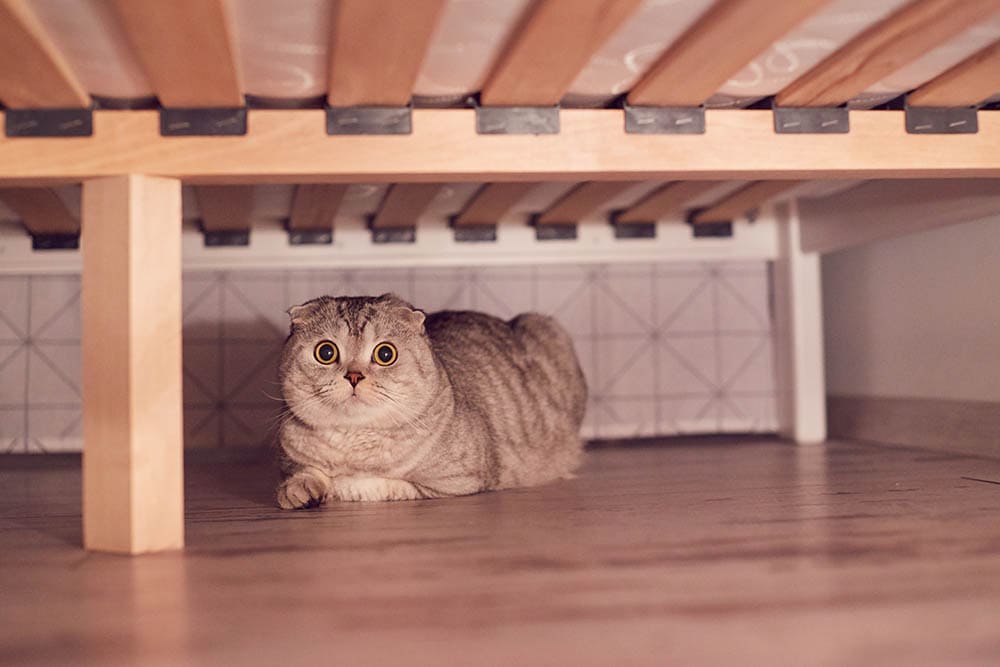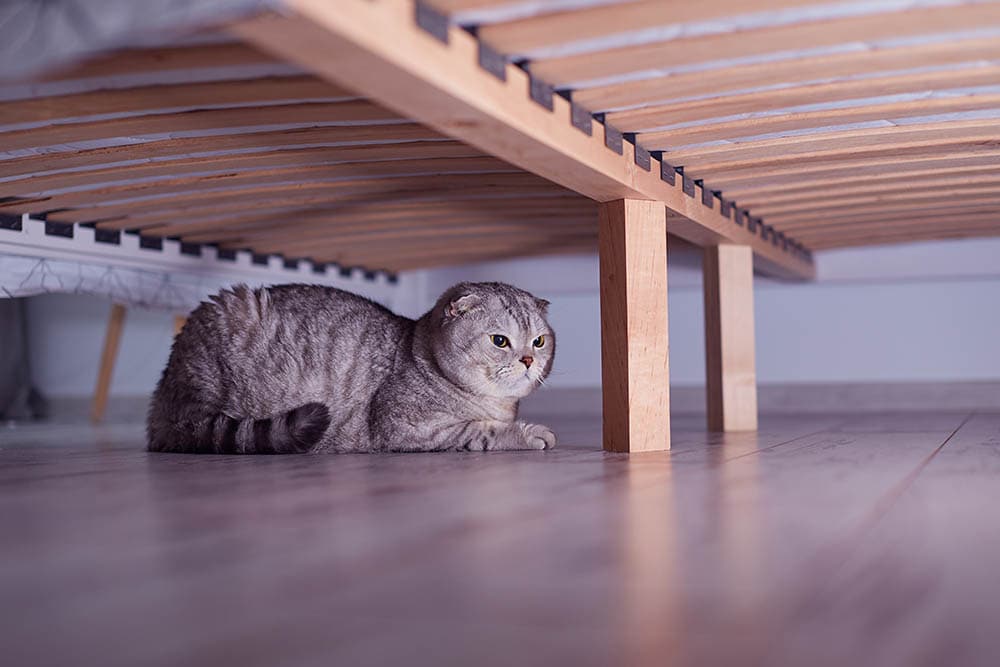
A cat’s hiding behavior is not unusual and should usually be nothing to worry about. Sometimes, they just want some peace and quiet. But other times, when a cat feels threatened or uncomfortable, their instincts prompt them to run and hide. Unlike dogs who are highly social animals, cats are solitary hunters and commonly seek a hidden spot to feel safe and secure.
It is not only the skittish cats who hide; even the bravest feline will still seek out a hiding spot when in a stressful environment. It may seem quirky, but there are actually plausible reasons why your cats like to hide.
This article will explore some possible reasons for a cat’s hiding all the time.
The 8 Reasons Why Your Cat May Be Hiding All the Time
1. Looking for Some Quiet Time
Cats have some of the strongest senses in the feline world. In our modern environment, these senses can easily overwhelm a cat. Therefore, your cat will likely slip away from anything that feels overstimulating and look for a quiet spot to rest peacefully.

2. They Secretly Like to Watch Their Surroundings
Cat enthusiasts understand that just because you cannot see your cat in your immediate vicinity, it doesn’t necessarily mean that your cat can’t see you. Hiding on a high post or under household furniture, for instance, gives cats a vantage point from which they can keep an eye on activities in their immediate environment without the possibility of being seen or disturbed. They often utilize this surveillance method when in a new environment.
They often utilize this surveillance method when in a new environment.
3. A Hunting Technique
Cats are notoriously stealthy hunters because of their ability to hide in secluded areas and stalk their prey. For domesticated cats that rarely hunt, they use this method when getting ready to pounce on another cat or any other pet in your home.

4. Temperature Regulation
Common cat hiding places like under the cabinet or couch often stay warm in winter and cool in summer. The cat will prefer to spend most of their day in such a warm and comfortable space where they feel relaxed and are hardly bothered.
Therefore, do not be so concerned when you have already ruled out possible dangers or sickness.
5. To Look for Peace From Rowdy Dogs, Kids, and Other Cats
If a cat shares its home with boisterous pets and children, things can get too exciting in your household for your cat to handle. Therefore, hiding can help them get some reprieve from being harassed, played with, petted, or even awoken from their comfortable slumber.

6. Cats Enjoy Squeezing Into Tight Places
Cat owners everywhere understand that cats like squeezing into tight spaces, especially in boxes. The main reason for this peculiar behavior is that when enclosed, cats have an assurance that nothing can sneak up on them. The same applies to tight hiding spots like under a bed or kitchen cabinet.
7. When Pregnant
Whenever a cat is expectant, it will look for a good hiding space to hide her litter, especially towards the latter stages of pregnancy. Since cats prefer giving birth in secluded areas, it’s not surprising that they will start hiding to create a nest.
Usually, this could be somewhere warm and cozy, like under the bed or in the closet, but this could technically be anywhere they feel safe.

8. When Feeling Sick or Injured
In some instances, cats will hide because they are ill or injured. While in the wild, sick cats will hide because they are more prone to attacks by predators. This is perhaps why cats have gotten so good at hiding their signs.
Most people barely even notice when their cats are sick until things turn worse. They can hide illnesses even for months on end while crouched up in hard-to-reach areas.
Possible Hiding Spots for Your Cat
Cats will always find comfortable, secluded, and usually high-positioned spots for hiding. Such an area can also be used as a resting spot where your cat enjoys its privacy without disruptions. Therefore, if your cat goes missing for a few hours and you keep wondering where they disappear to, consider checking the following places:
If your cat’s hiding spot is not inside the house, it may be outside in the following places:

How Long Does a Cat Stay in Hiding?
The duration that a cat may spend hiding will depend on the reasons why it went into hiding in the first place. For instance, a cat dealing with stress and anxiety issues will stay in hiding until it feels relaxed. A cat that hides due to danger will hide until it feels safe.
If a visitor is the reason for hiding, the cat will come out of their hiding spot once the visitor leaves. If the cat is hiding because of being introduced to a new home, it may take a few days or weeks to get acclimated to the new environment. Therefore, try to be patient since not all cats can adapt to new environments fast.
Sick or injured cats may need help to get out of their hiding spots sooner. It’s always best to take your cat to the vet once you notice any unusual hiding behavior.
How to Get a Cat Out of Their Hiding Place
If a cat goes into hiding, it’s recommended that you give it space and allow it to come out independently. However, if you notice it went into hiding due to an injury or illness, you may want to lure it out with treats so that you give it medical attention.
Conclusion
As observed, cats hardly face a dangerous situation head-on; most of the time, their first defense is looking for a safer hiding place. Hiding is also a natural behavior for timid cats. You will see them once or twice a day after they crawl out of their comfort zone in search of affection from their owners.
Also, do not worry; some cats prefer roaming around the house in the middle of the night and resting all day. However, if your cat is hiding due to illnesses or body injuries, you must lure it out for immediate medical attention.
Featured Image Credit: Konstantin Aksenov, Shutterstock








